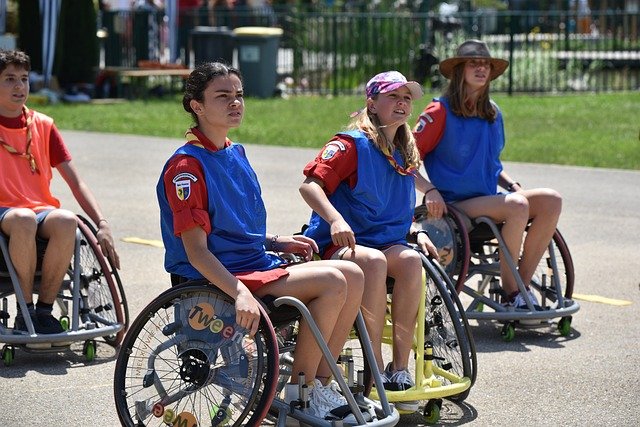Sports have always been a symbol of determination, resilience, and the human spirit. But when an athlete competes with a prosthetic limb, the story takes on an even deeper meaning. Prosthetic athletes are challenging the limits of human performance, redefining what is possible, and inspiring millions around the world.
Documentaries featuring these incredible athletes have played a key role in changing perceptions of disability and prosthetic technology. These films show not just the physical challenges these athletes overcome, but also the mental strength, training, and innovation that drive their success.
Through real-life stories of struggle, adaptation, and victory, prosthetic athletes in documentaries motivate people—disabled or not—to push past their own limits. Their stories prove that disability is not an obstacle but an opportunity to rewrite expectations.
Why Documentaries About Prosthetic Athletes Matter
Documentaries do more than just tell a story—they educate, inspire, and shift mindsets. When the world watches an athlete with a prosthetic limb compete, train, and triumph, it reshapes the way disability is viewed in society.
Breaking Stereotypes About Disability in Sports
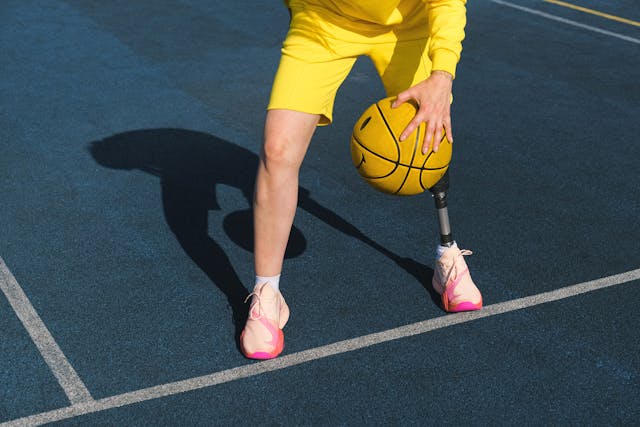
For decades, many believed that people with disabilities could not compete at an elite level. But prosthetic athletes in documentaries shatter this misconception. They showcase the truth:
- A prosthetic limb does not limit potential—it enhances it.
- Athletes with limb loss can compete at the highest levels, from sprinting to weightlifting.
- Technology is bridging the gap, allowing disabled athletes to perform just as well, if not better, than able-bodied competitors.
These documentaries not only educate audiences about adaptive sports but also help reduce bias and discrimination against athletes with disabilities. By showing them in the same light as any elite competitor, they help normalize inclusion in mainstream sports.
Inspiring Viewers to Overcome Their Own Challenges
Beyond disability awareness, these films inspire people from all walks of life. Whether someone is facing an injury, self-doubt, or life struggles, seeing an athlete push through their own limitations can be incredibly motivating.
Viewers see that:
- Adapting to change is possible, no matter the circumstances.
- Hard work and resilience are what define an athlete, not their physical abilities.
- A setback does not mean the end—it’s just the start of a new journey.
Prosthetic athletes don’t just compete against others—they compete against their own limitations, proving that persistence can achieve anything.
Driving Innovation in Prosthetic Technology
Many documentaries showcase the science behind prosthetics, highlighting how these devices are constantly evolving to enhance performance. From running blades for sprinting to advanced bionic limbs that mimic natural movement, these films introduce viewers to the cutting-edge technology shaping modern prosthetics.
This increased awareness often leads to:
- More investment in prosthetic research and development.
- Better accessibility for adaptive sports programs.
- A greater demand for inclusive policies in athletics.
As a result, these documentaries don’t just tell a story—they contribute to the progress of prosthetic innovation and accessibility.
Iconic Prosthetic Athletes Featured in Documentaries
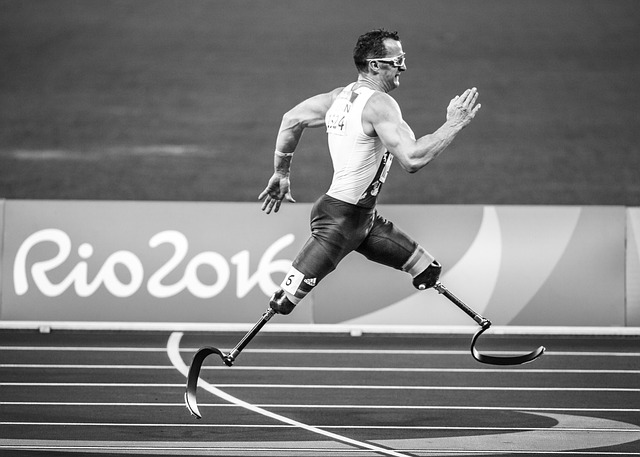
Over the years, many groundbreaking documentaries have showcased extraordinary athletes with prosthetic limbs. Their journeys of hardship, perseverance, and victory have left a lasting impact on millions.
Oscar Pistorius: The Blade Runner’s Impact on Athletics
Oscar Pistorius, famously known as “The Blade Runner,” was one of the first athletes with prosthetic legs to compete against able-bodied sprinters in the Olympics. His journey was documented in several films, including “The Fastest Man on No Legs”.
The documentary followed his:
- Transition from Paralympic success to competing in mainstream athletics.
- Challenges in getting approval to compete with able-bodied runners.
- Role in redefining sports technology, particularly carbon-fiber running blades.
Despite controversies in his personal life, Pistorius’ impact on breaking barriers in athletics remains significant. He paved the way for future athletes with prosthetics to compete on equal ground.
Mark Inglis: Conquering Everest on Prosthetic Legs
Mark Inglis, a mountaineer and double amputee, was featured in several adventure documentaries, chronicling his ascent of Mount Everest in 2006.
His story is particularly inspiring because:
- He lost both legs to frostbite while mountaineering.
- Instead of giving up, he trained harder, developing special prosthetic legs for climbing.
- He became the first double-amputee to reach the summit of Everest.
His documentaries highlight the resilience of the human body and mind, proving that even the world’s toughest environments can be conquered with determination and technology.
Tatyana McFadden: The Unstoppable Wheelchair Racer
While not a prosthetic user, Tatyana McFadden’s story in “Rising Phoenix” is one of the most powerful disability sports documentaries ever made. She has won multiple Paralympic gold medals and has dominated wheelchair racing for years.
Her journey mirrors that of many prosthetic athletes, as she:
- Fought for equal pay and recognition for Paralympic athletes.
- Became a symbol of breaking barriers for adaptive sports.
- Proved that an athlete’s success is determined by skill, not physical limitations.
McFadden’s story, along with those of prosthetic athletes worldwide, sends a clear message: disability does not define ability.
The Future of Prosthetic Athletes in Media
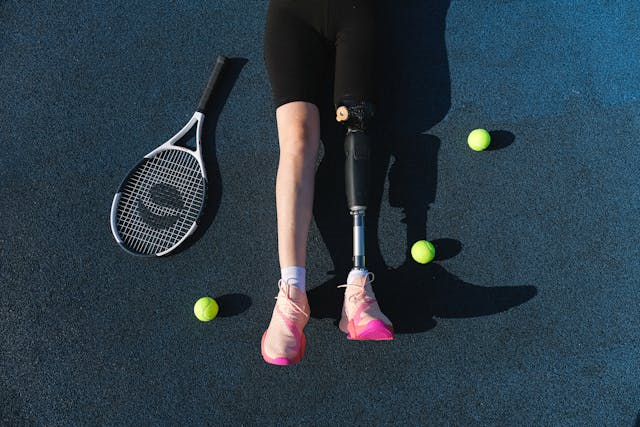
While documentaries have done a great job of highlighting prosthetic athletes, there is still more work to be done.
Increasing Representation in Mainstream Sports Media
Most sports networks still focus primarily on able-bodied athletes. Prosthetic athletes deserve equal media coverage, not just in the Paralympics but in mainstream sports conversations.
Sports documentaries should:
- Cover more adaptive sports leagues, beyond just the Paralympics.
- Highlight the technology behind prosthetic advancements.
- Feature more personal stories of athletes overcoming challenges.
By doing so, we eliminate the divide between able-bodied and disabled athletes, creating a world where everyone’s achievements are celebrated equally.
Pushing for Equal Opportunities in Competitive Sports
Even today, many sporting events do not allow athletes with prosthetics to compete against able-bodied participants. This limits inclusion and progress.
Documentaries can help:
- Push for rule changes that allow mixed competitions.
- Showcase how prosthetic technology can be regulated for fair play.
- Encourage sporting organizations to fund adaptive programs.
Through media, we can advocate for true inclusivity in global sports.
Inspiring the Next Generation of Prosthetic Athletes
The most powerful impact of documentaries is their ability to ignite passion in young athletes. Kids and teens with limb loss often struggle with confidence and self-belief. Watching a documentary about a prosthetic sprinter, climber, or weightlifter can change their entire mindset.
These films send the message that:
- There are no limits to what they can achieve.
- Prosthetics are not just replacements—they are tools for greatness.
- Their dreams of being professional athletes are 100% possible.
As prosthetic technology advances, we will see even more athletes breaking records, competing globally, and inspiring millions.
The Global Impact of Prosthetic Athletes in Documentaries
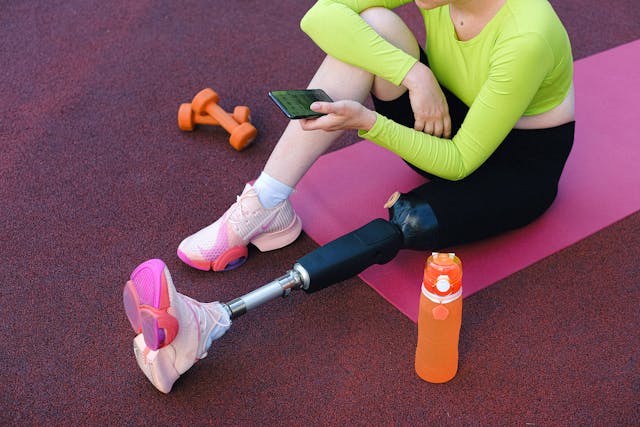
Prosthetic athletes showcased in documentaries are doing far more than winning races or climbing mountains—they are changing how society views disability, technology, and human potential. Their stories are creating waves of inspiration in multiple areas, from education and healthcare to policy and innovation.
Through powerful storytelling, these athletes are leaving a lasting mark on the world.
Challenging the Definition of Disability
For many years, society viewed disability as a limitation, a weakness, or a reason for exclusion. Documentaries about prosthetic athletes have helped dismantle these outdated beliefs by showing:
- Disability is not a barrier to success. Athletes with prosthetics train just as hard as able-bodied competitors and compete at elite levels.
- Technology can enhance ability, not just restore it. Modern prosthetics allow athletes to run, jump, swim, and cycle with precision, proving that performance is about skill, not physical limitations.
- Inclusion in sports should be the norm, not the exception. Seeing athletes with prosthetics thrive encourages sporting organizations, schools, and communities to rethink how they support disabled athletes.
By shifting perspectives, these documentaries have helped normalize disability in sports and everyday life. Today, seeing a runner with blades or a powerlifter with a prosthetic arm is no longer shocking—it’s inspiring and expected.
Advancing Prosthetic Technology and Innovation
One of the most exciting impacts of prosthetic athletes in documentaries is the rapid evolution of prosthetic technology. As the world watches amputees break records, climb mountains, and push human limits, engineers, scientists, and investors are driven to develop better prosthetic solutions.
These films:
- Increase global interest in advanced prosthetic research. The demand for lighter, more responsive, and more efficient prosthetics is higher than ever.
- Encourage collaboration between athletes and engineers. Many prosthetic athletes work closely with designers to customize their limbs for peak performance.
- Showcase the role of AI and robotics in mobility. Some documentaries have introduced audiences to bionic limbs controlled by brain signals, proving that prosthetic technology is reaching futuristic levels of innovation.
As these documentaries gain popularity, the conversation about prosthetic advancements becomes mainstream, leading to better funding, accessibility, and breakthroughs in assistive technology.
Driving Policy and Accessibility Changes
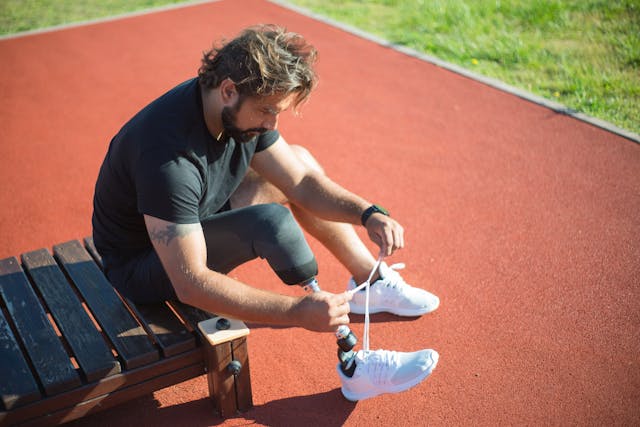
Beyond sports, prosthetic athletes featured in documentaries are influencing policy changes that improve accessibility for all people with disabilities. These films:
- Encourage governments to fund adaptive sports programs. Seeing athletes succeed with prosthetics makes it clear that investment in sports accessibility is needed at all levels.
- Push for workplace and public space accessibility. When people watch these documentaries, they begin to question: “If an amputee can run marathons, why aren’t cities more accessible for wheelchair users?” This leads to pressure on governments and businesses to improve infrastructure for all disabilities.
- Highlight the importance of equal opportunities in athletics. These documentaries are driving conversations about fair competition, funding for Paralympic sports, and inclusion in mainstream sporting events.
By showcasing real-life struggles and triumphs, these films make policy-makers, businesses, and educators more aware of the changes needed to create a truly inclusive world.
How More People Can Support Prosthetic Athletes and Their Stories
The impact of prosthetic athletes in documentaries is undeniable, but their success also depends on global support. The more people watch, discuss, and promote these films, the greater the awareness, funding, and inclusivity they generate.
Here’s how anyone—disabled or able-bodied—can help drive this movement forward.
Watch and Share Disability Sports Documentaries
One of the easiest ways to support these athletes is to watch their documentaries and share them with others. Whether it’s a feature film, a short documentary, or a YouTube series, exposure matters.
By streaming, reviewing, and recommending these films, audiences help:
- Increase visibility for adaptive sports on mainstream platforms.
- Encourage streaming services to invest in more disability-focused content.
- Spread awareness about the incredible achievements of prosthetic athletes.
Some must-watch documentaries that highlight prosthetic athletes and adaptive sports include:
- “Rising Phoenix” (2020) – A powerful film about the history and impact of the Paralympics, featuring world-class disabled athletes.
- “Unstoppable: Bethany Hamilton” (2019) – A documentary about Bethany Hamilton’s journey as a competitive surfer with one arm.
- “Against All Odds” (2012) – Follows several Paralympic athletes as they train for the London 2012 Games.
By amplifying these stories, we help make disability representation in media more common.
Support Adaptive Sports Organizations and Events
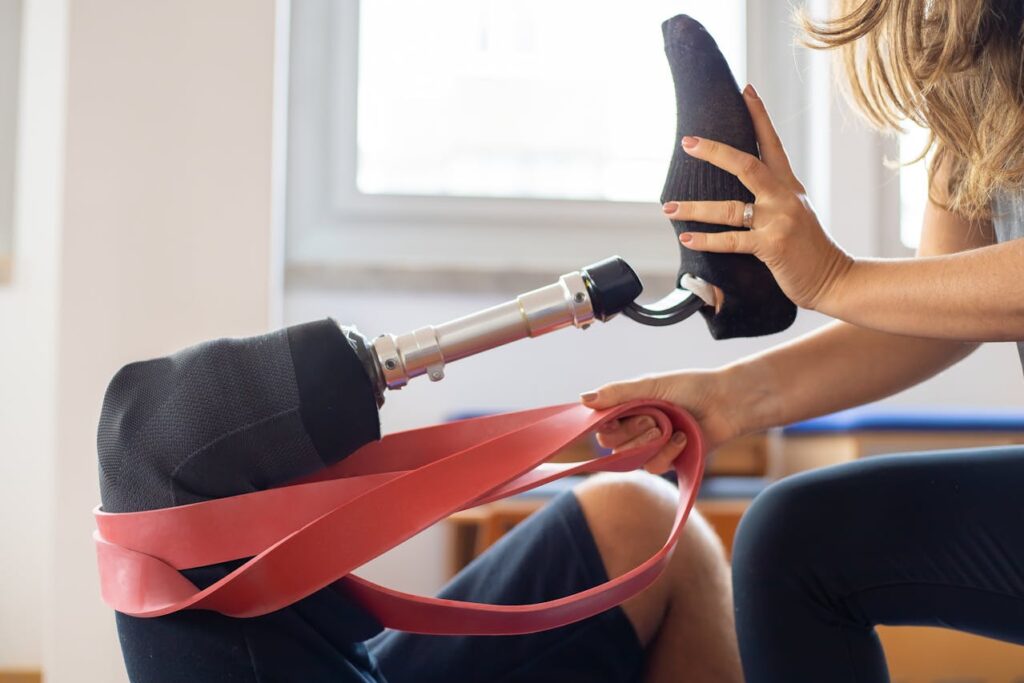
Beyond watching documentaries, people can support prosthetic athletes by engaging with real-life adaptive sports communities. This can include:
- Attending Paralympic and adaptive sports events. Showing up to these competitions boosts visibility and funding for athletes.
- Donating to organizations that provide prosthetics to athletes in need. Many developing countries lack access to advanced prosthetic technology—donations can help aspiring athletes get the equipment they need.
- Encouraging schools and sports clubs to offer inclusive programs. Youth sports programs should include opportunities for kids with disabilities to try out different sports.
By actively supporting these initiatives, we create a future where every athlete—regardless of physical ability—has the opportunity to compete and excel.
Advocate for More Representation in Media and Sports
Even with growing recognition, prosthetic athletes still face barriers in media and mainstream sports. Everyone can play a role in advocating for greater inclusivity by demanding better representation.
- Encourage sports networks to broadcast more adaptive sports. Many major competitions are still not aired on mainstream TV—this needs to change.
- Support brands and companies that sponsor disabled athletes. More sponsorships mean better funding, better training, and better recognition for prosthetic athletes.
- Call for fair policies in competitive sports. Some sports federations still restrict prosthetic athletes from competing against able-bodied competitors—advocacy can help change these outdated rules.
The more we normalize prosthetic athletes in media and competitive sports, the faster we move toward a world where ability is measured by skill—not by physical differences.
Final Thoughts: A Movement Beyond Sports
The rise of prosthetic athletes in documentaries is more than just a sports story—it’s a global movement for inclusivity, innovation, and human potential. These films have changed the way we see disability, competition, and perseverance.
At Robobionics, we believe that every person deserves access to the technology and support they need to reach their full potential. The athletes featured in these documentaries prove that the only limits that exist are the ones we refuse to challenge.
Their journeys are not just about winning medals—they are about rewriting the rules of possibility. And in doing so, they inspire generations to come.



